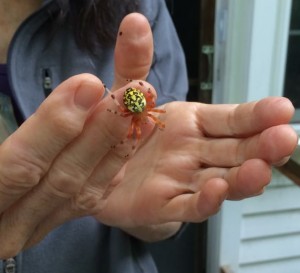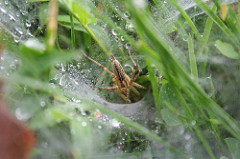These three things you should know about spiders. But first, know this. They’re not bugs. In fact, insects probably outnumber spiders roughly 10 to one. Too bad so many things get blamed on spiders — insect bites, say, or medical conditions that require intervention.
One. We are not their prey.
In fact, most couldn’t bite us if they wanted to. Their fangs are too small, too weak to break our skin. Only one species that could make us really sick lives in the Northeast: the black widow spider, and it’s rare in New York. Sure, if we accidentally blunder into a spider, it does what we might under similar circumstances. It reciprocates, only with its fangs.

With so many kinds and no real threat, spiders make a wonderful subject for nature walks with kids, says Jody Gangloff-Kaufmann, community coordinator with NYS IPM. “What’s cooler than watching a spider eat a fly?”
Two. Spiders help with indoor pests.
Worried about cockroaches, flies, earwigs, clothes moths? Your friendly neighborhood spiders will take them down. In fact, spiders will do in most of your household pests if you but let them — and long-legged cellar spiders will take down black widows in the dark, hidden places they like to call home. Meanwhile a study in Kansas, where brown recluse spiders abound, collected 2,055 from one home over a six-month span. Yet not a single person was bitten. Inside your home, “live and let live” is the ideal IPM solution.
Three. Spiders help with outdoor pests.

Flies, mosquitoes, ants, caterpillars, slugs, that sort of thing — spiders are on the hunt for them. Not for us. And they’re great in the garden. Some leap on their unsuspecting prey; a silken tether helps keep them falling too far if they miss. Some run down their prey. Some build funnel-shaped (but not sticky!) webs in low vegetation, dashing out to snag insects that wander by. Some wear camouflage, taking on the color of whatever blossom they’re waiting in.
Apparently some even narrow their “feeding niche” to concentrate on an abundant prey source — a good thing if that prey is something we’d rather not have in yards, buildings or farms. Want to welcome spiders to your garden? Learn how here.
If you still don’t want spiders in your home, you’re hardly alone. IPM solutions? NYS IPM’s Matt Frye suggests scooping them into a container and escorting them outside. Alternatively, vacuum them up.